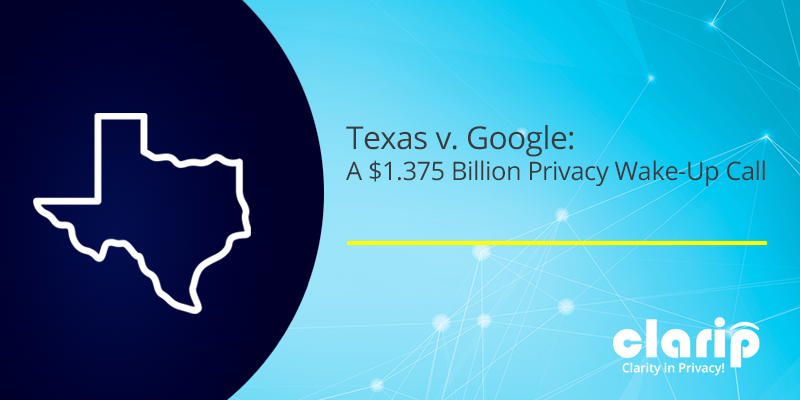Texas v. Google : A $1.375 Billion Privacy Wake-Up Call

In May 2025, Google agreed to a $1.375 billion settlement brought by the Texas Attorney General over alleged violations of state biometric and consumer privacy laws. This historic settlement marks the largest privacy-related monetary settlement ever obtained by a single state in the U.S.
Does this mark Texas as the most aggressive privacy regulator in the country, or is this the beginning of a larger trend? Regulators will pursue enforcement against the major global tech giants. For enterprises across all sectors, the implications are clear: privacy compliance is no longer optional or left to the last minute. Proactive measures are essential to mitigate similar outcomes.
Texas v. Google
In 2022, Texas AG Ken Paxton sued Google for allegedly capturing and using Texans’ biometric data, including facial geometry and voiceprints, without adequate notice or consent. These practices – enabled through services like Google Photos, Nest, and Google Assistant – were said to have violated Texas’ Capture or Use of Biometric Identifier Act (CUBI) and the Deceptive Trade Practices Act (DTPA).
The Key allegations were:
- Collected biometric identifiers from photos and voice interactions
- Failed to obtain informed consumer consent
- Retained data indefinitely without disclosure of retention policies
The $1.375 billion settlement, reached in 2025, resolves the claims without any admission of guilt from Google. This follows a similar $1.4 billion settlement from Meta over facial recognition use. The Meta settlement was reached in July 2024.
The Legal and Regulatory Impact
This settlement serves as a clear call – a clarion call – to enterprises that handle consumer data:
- Biometric data is highly sensitive and protected under multiple state laws.
- Notice and consent are not abstract principles; they are enforceable legal requirements.
- Retention, use, and sharing policies must be transparent, documented, and time bound.
Privacy laws in states like Texas, Illinois, California, and beyond continue to expand in scope. The risks of noncompliance now include:
- Billion-dollar penalties
- Reputational damage
- Increased litigation from private rights of action in some jurisdictions
Best Lessons for Enterprises
The Google-Texas case illustrates several urgent best practices. Some to consider:
- Biometric data policies must be airtight. Any use of facial recognition, voice recognition, or fingerprinting technology requires clear documentation, opt-in consent, and retention limits.
- Consent mechanisms must be user-centric and verifiable. Bundled or implied consent is increasingly vulnerable to challenge.
- Privacy policies must reflect actual practices. Inconsistencies between stated and actual practices can form the basis of litigation. This has been found to be true in several cases.
- State-specific compliance is necessary. Enterprises can no longer rely on generalized compliance programs. As we all know, state laws are nuanced, subject to amendments, and demand localized strategies.
Why Enterprises Choose Clarip for Compliance
Clarip is leading the way in enterprise-grade privacy management. The platform is trusted by Fortune 500 companies and major international brands to meet rapidly evolving privacy regulations across all jurisdictions.
What sets Clarip apart:
- Comprehensive U.S. State and International Law Intelligence: Real-time compliance guidance across 20+ state privacy laws, including Texas CUBI, California CCPA/CPRA, Virginia CDPA, GDPR, and beyond.
- Biometric Data Governance: Tools to help identify and classify biometric and other sensitive data in your systems.
- Consent & Preference Management: Industry-best UI/UX tools to obtain, log, and honor consent across multiple channels – like web, mobile, and IoT. The California Lawyers Association has used Clarip as an example of best consent practices.
- Automated Risk Assessments: Clarip’s Privacy Intelligence Dashboard allows enterprises to quickly evaluate privacy risks before launching new products or data initiatives.
- Request Automation & Audit Trails: Full workflow automation for data subject rights (DSR) requests with detailed reporting to demonstrate compliance.
- Trusted by Industry Leaders: Clarip helps global brands strengthen privacy compliance, even after facing regulatory scrutiny. Reach out for Success Stories.
Clarip bridges the gap between legal requirements and technical implementation, ensuring organizations stay ahead of regulators and consumers alike.
Be Proactive and Stay Ahead of the Regulators
The Google-Texas settlement is not just about one tech giant – It’s a warning to every enterprise that handles personal data. Regulators are raising the stakes, and the cost of missteps is unprecedented. With Clarip as a partner, enterprises can confidently navigate the complex landscape of data privacy laws, mitigate risk, and build lasting trust with consumers.

 Data Risk Intelligence
Data Risk Intelligence Automated Data Mapping
Automated Data Mapping Do Not Sell/Do Not Share
Do Not Sell/Do Not Share Cookie Banner Solutions
Cookie Banner Solutions Consent & Preferences
Consent & Preferences Data Rights Requests
Data Rights Requests
